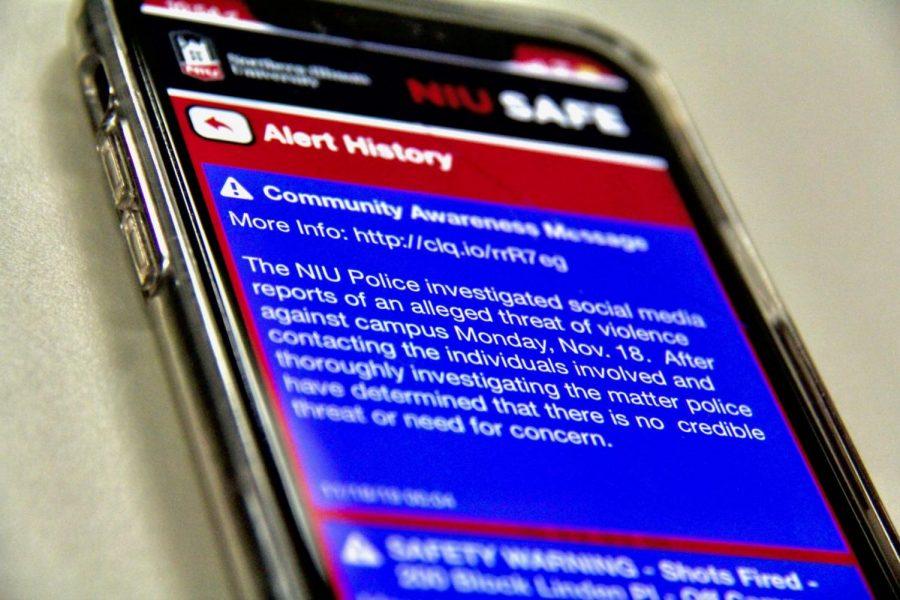Students on social media should verify information before sharing
In the age of social media, rumors of alleged threats can spread in seconds and be blown out of proportion.
November 20, 2019
Any possible threat to campus should be taken seriously, but spreading rumors on social media about threats that aren’t proven to be true does more harm than good in making the student population feel safe. Students should have waited for the university police to determine if the alleged safety threat from Sunday night was valid before making the situation seem more serious than it turned out to be.
The Department of Police and Public Safety sent out a Facebook message, a text message and automated voice message through the NIU safety alert message system and the Dean of Students sent an email to students explaining that the alleged threat regarding Monday turned out to be a false alarm. University police, who already investigated the situation, launched a second investigation as a result of social media posts and questioned the students involved and determined there was still no threat.
“We were notified early afternoon on Sunday of a potential threat,” NIU Police Chief Thomas Phillips, said. “When we found out about it we responded immediately, and determined the threat was unfounded. Later in the evening, there were posts on social media relating to a safety threat that we then investigated and went through all the same steps again to find out it was the same situation we had responded to earlier.”
The community awareness message from Sunday night came after many students had shared a screenshot from Snapchat, where a response to the alleged threat was posted. Posts about the situation were circulating on NIU student Facebook groups, such as the Class of 2020 and 2021 pages.
It is justifiable for students to want to inform their peers of a possible danger on campus, but problems can arise when students make assumptions and accusations against specific students whom they believe could be the attacker. Without information from campus authorities, it is inappropriate to spread rumors on social media. The connectivity of the internet allows students to hastily spread false information, which can make serious situations like these even more difficult to understand.
“Don’t always trust what you see online, and always verify your source of information,” Phillips said. “Students should use the NIU Safe App to get credible safety information from university police.”
Sunday night, on the official NIU Class of 2023 student Facebook group, there were posts from students claiming that a specific student was the culprit behind the alleged threat. Such accusation could be harmful to students who are named, making students feel ostracized. Students trying to investigate the safety threat resulted in serious cyber-bullying.
“I feel that rumors are just someone’s interpretation of things they see, mostly relating to social media,” Megan Rault, first-year jazz studies major, said. “Fear was caused, but I wouldn’t say it was unnecessary. I believe student caution and concern was entirely appropriate given these circumstances.”
Many students decided not to go to class as a result of the rumor which can be seen from the posts on the Class of 2020 and 2021 student Facebook groups. Some teachers even decided to cancel their classes by sending out emails. This disruption of education wasn’t warranted and shows that fear has defeated our community.
Instances of school shootings that have recently occurred in the U.S. could be the cause of fear in students and the amount of caution exercised, despite there being no real danger.
“As a police response, we take every situation seriously,” Phillips said. “Community members should have confidence in us that the campus is safe. We base our assessments on real time response and upon facts.”
We need to adopt a new approach to dealing with safety threats. As a student population, we shouldn’t have to live a life where fear can spread so easily and control our daily routines.







